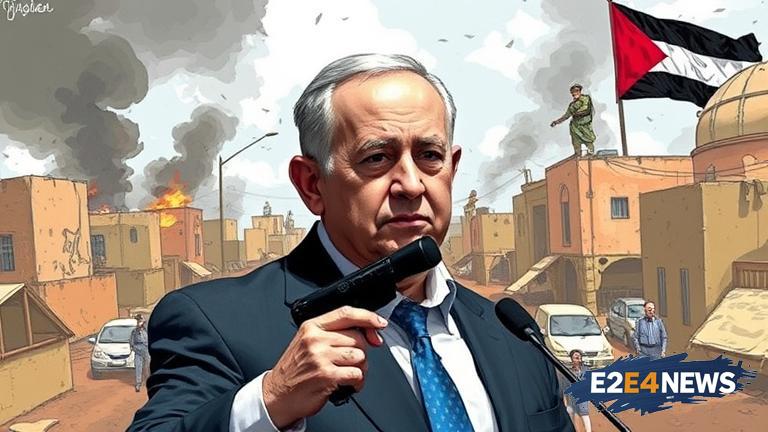The Israeli government, led by Prime Minister Benjamin Netanyahu, has announced its intention to pursue a full occupation of the Gaza Strip. This move comes amidst escalating violence in the region, with both Israeli and Palestinian forces exchanging blows. The situation has been deteriorating for months, with tensions simmering just below the surface. Netanyahu’s announcement has sparked widespread concern, with many fearing that a full occupation could lead to further bloodshed and destabilization in the region. The Gaza Strip, a coastal territory bordering Egypt and Israel, has been a focal point of conflict for decades. The area is home to over 2 million Palestinians, who have been living under Israeli blockade since 2007. The Israeli government has long maintained that its actions in Gaza are necessary to protect its citizens from militant attacks. However, Palestinian leaders argue that the blockade and occupation are a form of collective punishment, stifling the economy and causing widespread suffering. The international community has also weighed in on the issue, with many calling for a peaceful resolution to the conflict. The United Nations has condemned Israel’s actions in Gaza, citing human rights abuses and disproportionate use of force. Despite this, Netanyahu remains resolute in his pursuit of a full occupation, citing the need to protect Israeli citizens from terrorism. The Israeli military has already begun to mobilize troops and equipment along the Gaza border, sparking fears of an imminent invasion. Palestinian militants, including Hamas, have vowed to resist any Israeli occupation, setting the stage for a potentially bloody conflict. The situation is further complicated by the involvement of other regional players, including Egypt and the United States. Egypt, which has long played a key role in mediating the conflict, has urged restraint on both sides. The United States, a key ally of Israel, has also called for calm, while stopping short of condemning Israel’s actions. As the situation continues to deteriorate, many are left wondering what the future holds for the region. Will Netanyahu’s pursuit of a full occupation lead to a lasting peace, or will it simply perpetuate a cycle of violence and bloodshed? Only time will tell, but one thing is certain: the fate of the Gaza Strip and its inhabitants hangs precariously in the balance. The international community must come together to find a peaceful solution to this conflict, one that respects the rights and dignity of all parties involved. The consequences of failure are too great to contemplate, and the world cannot afford to stand idly by as the situation spirals out of control. In the meantime, the people of Gaza will continue to suffer, caught in the crossfire of a conflict that seems to have no end in sight. The world must act now to prevent further bloodshed and to find a lasting solution to this intractable conflict. The future of the Middle East depends on it. The Israeli-Palestinian conflict is one of the most enduring and complex conflicts of our time, with roots dating back decades. It is a conflict that has been marked by periods of relative calm, punctuated by outbreaks of violence and bloodshed. The conflict has also been marked by numerous attempts at peace, including the Oslo Accords and the Camp David Summit. Despite these efforts, a lasting peace has yet to be achieved, and the situation remains volatile. The conflict has also had a profound impact on the region, contributing to instability and extremism. It has also had a significant impact on the global community, with many countries weighing in on the issue. The United States, in particular, has played a key role in the conflict, providing significant financial and military aid to Israel. The European Union has also been involved, providing aid to the Palestinian Authority and calling for a peaceful resolution to the conflict. The conflict has also been marked by numerous human rights abuses, including the use of disproportionate force and the blockade of Gaza. The international community has condemned these abuses, calling for accountability and justice. Despite this, the situation remains dire, with many Palestinians living in poverty and without access to basic necessities like food and water. The conflict has also had a profound impact on the environment, with the blockade of Gaza leading to significant pollution and degradation. The situation is a complex one, with many different players and interests involved. However, one thing is certain: the conflict must be resolved through peaceful means, and the rights and dignity of all parties must be respected. The world cannot afford to stand idly by as the situation spirals out of control, and it is up to the international community to come together to find a lasting solution. The fate of the Gaza Strip and its inhabitants hangs in the balance, and it is up to us to act. The time for action is now, and the world must come together to prevent further bloodshed and to find a lasting peace. The Israeli-Palestinian conflict is a complex and enduring one, and it will require a concerted effort to resolve. However, with the help of the international community, it is possible to find a peaceful solution, one that respects the rights and dignity of all parties involved. The future of the Middle East depends on it, and it is up to us to act. The world must come together to find a lasting solution to this conflict, and to prevent further bloodshed and suffering. The time for action is now, and the fate of the Gaza Strip and its inhabitants hangs in the balance.





